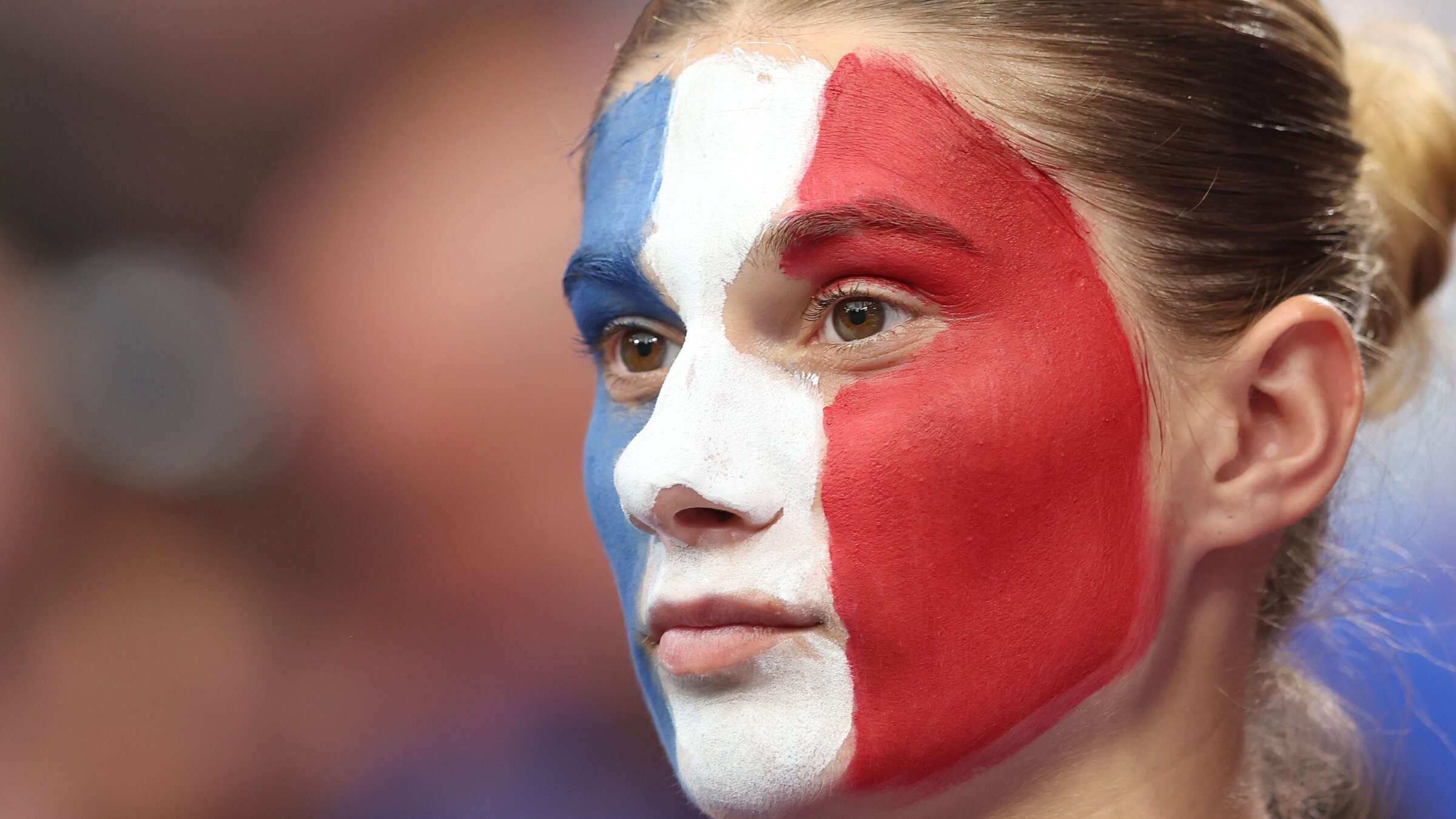They’re celebrating the Olympics in Paris, but the war in the Middle East feels close at hand
Fear and anxiety seem like constants for Jews in the City of Light

A French sports fan displays her national pride. Photo by Getty Images
In Paris, police are everywhere. Sure, the Olympics are here, but I can’t help thinking that the threat of widening war in the Middle East is part of the high alert. I was not surprised to read that Taylor Swift concerts in Vienna had been cancelled due to a terror threat from two men, including a 19-year-old Austrian citizen who “had recently pledged allegiance to the Islamic State,” according to The New York Times.
These days, any event attracting tens of thousands of citizens from all over the world is a risk, and so I always keep my eyes open.
The police here aren’t like those I’ve seen recently in Israel and in the U.S.; in groups of three police officers, only one carries an Uzi — and the officer holds it in front, like a bouquet of flowers.
In front of my hotel in the first arrondissement, I have seen a quartet of policewomen on horseback, multiple times; then a trio of men on horseback. The groups of fashionable-looking officers wearing black, looking like freshmen who live in a college dorm going out to a nice dinner, don’t do much to reassure me.
“Insufficiently armed,” I keep thinking.
I’d been wondering why I kept seeing police in this area. A man I spoke with at the very cool coffee shop next door explained that these police officers were not from Paris; they had been brought in, from all over France, to help with the Olympics. I did not tell him that I had done a lot of walking, and had only seen police in certain neighborhoods, and I wondered why.
I also did not tell him that I had other worries. The government of Israel has warned citizens to stay away from anything that might seem Jewish or Israeli in Europe, including kosher restaurants and Chabad houses.
I lived in Paris as a student, and I know there is some delicious kosher food here; I also know that kosher supermarkets in this city have previously been the target of terror attacks. I let myself wistfully remember the delicious matzos made with orange liqueur that I bought here years ago when I studied at the Sorbonne.
The other day, I had a conversation with a lovely Jewish woman whose family lived in France before World War II; though she grew up in America, she has lived here in France for more than 20 years.
Within view of the home of Léon Blum — the Jewish Prime Minister of France who was later imprisoned at Buchenwald — she talked about the effect of Oct. 7 and its aftermath on her teenage daughter, the only Jewish girl in her class. Concerned, the mother sent the daughter to Jewish camp for the first time. “I noticed that she stopped biting her nails while she was away,” the mother said.
The comfort — and let’s just say it, safety — of an all-Jewish environment had a physical effect.
Imagine noticing that.
Later, I found myself sitting next to an American family of serious sports fans while having a much-needed coffee at the Musée d’Orsay — which felt way too crowded for comfort. The mother and father both had American flags painted onto their cheeks, like make-up. Other eaters in the café wore head-to-toe gear for Brazil, or Germany. Needless to say, it would be unsafe to drink a coffee with an Israeli flag painted on your cheek.
Each morning in my hotel, I carefully put anything with Hebrew on it — like contact-lens solution I had purchased in Israel — in my suitcase, and then zip it up. I do the same with a water bottle, and with a book I am reading.
On the outside of the Musée d’Orsay, there is a plaque that memorializes the fact that this was the main returning point for prisoners released from concentration camps and forced-labor camps. The museum was previously a railway station. That fact is mentioned in the museum’s tourist materials, but there is nothing about its role as the Holocaust ended. Similarly, on the gorgeous Seine river, I was unable to find any mention of the great poet Paul Celan, who committed suicide by drowning himself in the river. I was thinking about Jewish history and how it can sometimes be hidden here, because what is happening in Israel and the Middle East also seems hard to see here right now.
Except for this.
Despite France’s lofty ideals, it’s often unsafe to just be Jewish here. While I enjoyed some delicious grapefruit sorbet — the first grapefruit sorbet of my life — the woman who grew up in America and moved to France told me that antisemitism has risen an eye-popping 1,000% over the past year.
But who needs statistics? The proof can be seen in a young girl’s fingernails.

















